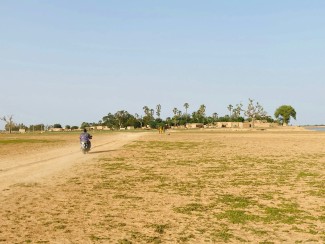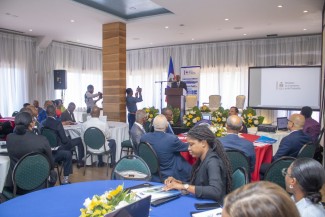Why we must stand behind the rules-based global trading system now, more than ever
Originally published by Devex on 5 July 2018
Amidst the current uncertainty among major global trading partners and subsequent instability in the world’s economy, it may be tempting to think that the international rules-based trading system has failed to deliver on all of its promises
The opposite is true, however. It is the system that will enable us to tackle growing sentiments that trade doesn’t benefit poor and rural communities. It is the system that ensures peace and stability worldwide by acting as a bulwark against unilateral actions. It is the system that will save us from our worst impulses toward protectionism and isolationism. This is the time when we must all stand by the global trade system.
It is also a time of great change. According to International Monetary Fund’s latest global gross domestic product forecast, after years of sluggish growth, the global economy is expected to grow by about 3.9 percent this year and the same again next year. This outpaces gains made in the previous decade.
New technologies are changing the employment landscape at a pace never seen, and we are in the midst of historic revolutions in digital transactions. These revolutions will profoundly impact the world’s poorest people, and depending on how they cope with the digital divide, will either entrench or level existing inequalities.
And yet, we’re still a way off that future.
The world's poorest nations, termed least developed countries, still engage in less than 1 percent of global trade despite being home to 13 percent of the world’s population. With only two years remaining, we are falling short of the Sustainable Development Goals’ commitment to double trade in LDCs by 2020.
LDCs face significant barriers that hamper their ability to trade — they struggle to enter international markets, to support their domestic private sector, and to seek out new regional and global opportunities.
This is why now, more than ever, it is important to ensure that trade is truly inclusive, allowing small enterprises, women, and innovative businesses to take an active role in the global trading system.
EVERYONE BENEFITS FROM THE GLOBAL TRADING SYSTEM
The international rules-based trading system helps to ensure everyone benefits from trade.
Countries that are not great powers rely more on the global system of cooperation and rules to ensure that their voices are heard. And of course, smaller economies desperately need access to other markets in order to grow and develop.
The multilateral trading system provides all of this. It gives the world’s poorest countries a voice at the negotiating table. It gives them the power to articulate their priorities through partnerships with like-minded countries. It is transparent, accountable, predictable, and consensus driven.
If this system didn’t exist, the opportunity for LDCs to put their trade priorities on the agenda would be negligible. The multilateral trading system is the best way to leverage trade to combat poverty and inequality. So we shouldn’t be trying to shut trade down — we should be redoubling our efforts to make trade truly inclusive.
Initiatives such as Aid for Trade and the Enhanced Integrated Framework are crucial in helping least developed countries build their capacity to trade through strengthened institutions and trade policies. For every dollar they’ve invested in aiding the development of trade in these countries, $20 worth of exports have been generated.
Take The Gambia, for example. With EIF’s support, the small country has greatly enhanced its export capacity for many products by transforming processes across the value chain — from farm to processing plants to cargo facilities.
On-farm training and support for processing plant operators have increased quality and production capacity of key crops, such as cashew and sesame. This has increased incomes for rural communities around the country. A new cargo complex fitted at the Banjul International Airport has helped to put The Gambia on the world map, expected to speed up export processes by 50 percent.
The Gambia has also been supporting private sector development, particularly small-scale investors, women, and aspiring young entrepreneurs, encouraging the private sector to diversify and add value to products in order to create jobs and increase their access to bigger regional and international markets.
Another example of the unifying power of the global trading system is the Trade Facilitation Agreement. This multilateral deal, which is expected to reduce the time needed to import goods and to help new firms export for the first time, has united 136 countries so far, including 21 LDCs in Africa, Asia, and the Pacific who have ratified the deal and are now working toward implementation.
They also stand to benefit the most: According to World Trade Organization estimates, African countries and LDCs are expected to see the biggest average reduction in trade costs — in excess of 16 percent — from full implementation of the TFA..
NO ONE LEFT BEHIND
Trade has been one of the most powerful antipoverty tools in history. It has helped to lift a billion people out of poverty in developing countries. And, it has improved lives and livelihoods in developed countries.
While the benefits of trade don’t reach as many people as they should, inclusive trade initiatives like those of WTO, EIF, and the International Trade Centre are working hard to ensure that countries often left behind in regional and bilateral trade agreements have the opportunity to contribute to, and benefit from, global markets.
In an increasingly interdependent world economy, it is our responsibility to ensure that we bolster global economic cooperation — and that we leave a strong and well-functioning trading system for future generations. That is why, following the EIF Global Forum on Inclusive Trade for Least Developed Countries this June at WTO, The Gambia signed on to a first-of-its-kind call to action, along with ministers from Malawi, the Central African Republic, and Uganda.
We have more work to do, but we can only do it together, within a trading system where everyone has the opportunity to contribute.
Header image of South Africa's President receiving a consignment of Personal Protective Equipment (PPE) and other medical supplies - ©GCIS/South African Government via Flickr Creative Commons Attribution-NoDerivs 2.0 Generic (CC BY-ND 2.0) license.
If you would like to reuse any material published here, please let us know by sending an email to EIF Communications: eifcommunications@wto.org.



